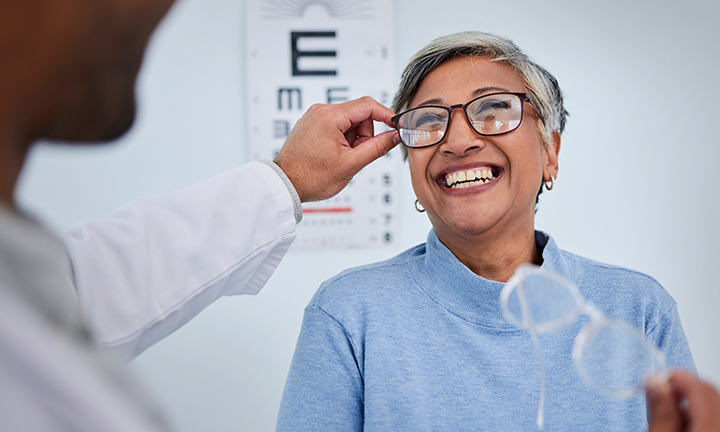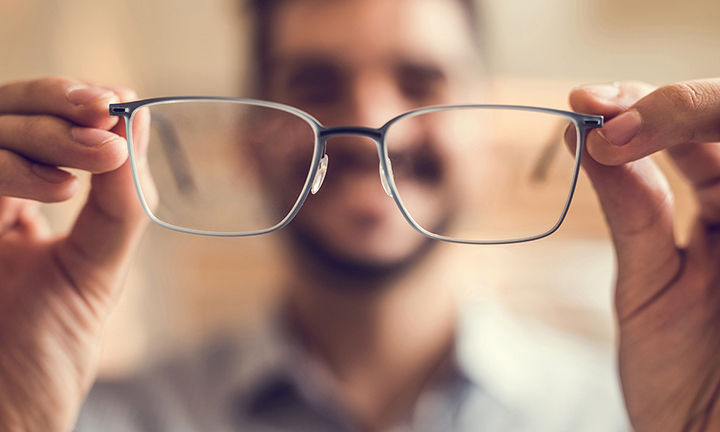Contact lenses can give you a new way to view your world with clarity. Perhaps you are a loyal contact lens wearer and you just want to know how to get the best coverage in the coming year. Maybe you are new to wearing contacts and are wondering what the fuss is all about. No matter who you are or what questions you have, we have answers when it comes to contacts and vision insurance.
What are the benefits of contact lenses?
While some of us love having eyeglasses on our face to correct our vision and make a statement, contact lenses offer several benefits that can be hard to pass up. For most people, one of the biggest benefits is not worrying about fogged up or dirty lenses. With changing weather conditions and the situations where wearing a mask is advised, it’s easy for a pair of regular glasses to fog up, get dirty, or get in the way.
Convenience with outdoor activities and other action-oriented tasks is also high on the list of contact lens benefits. You can wear any sunglasses you like with contacts, and easily put on goggles for skiing or other high-impact activities.
What are the different types of contact lenses?
Thanks to advancements in vision and medical technology, contact lenses have far more options for comfort and daily wear than ever before. According to the American Optometric Association, contact lens types include:
• Rigid Gas-Permeable (RGP) Contact Lenses – these hard lenses are long lasting, can correct more vision conditions than soft lenses, and some can be worn overnight.
• Extended Wear Disposable (soft) Contact Lenses – worn for 1-30 days then discarded; best for those who don’t want to clean lenses by hand.
• Planned Replacement (soft) Contact Lenses – lenses that are cleaned after each wearing, then replaced on a schedule (monthly, bimonthly, or quarterly).
Rigid lenses can correct astigmatism and they tend to be easy to care for and place on the eye. However, soft lenses may feel more natural when worn, and have the convenience of optional disposable types to avoid daily cleaning. With all contact lenses, proper care is crucial to avoid particles irritating the eye or infections.
For even more of your questions answered about what it’s like to have contacts, including getting used to wearing them and more, check out our contact lenses FAQ.
Are contact lenses covered by insurance?
Once you’ve decided to go with contacts, you have options. First, you’ll get an eye exam specifically for contact lenses, to make sure your eyes’ shape will work well with current lens technology, and that you are fitted properly. It’s important to have contacts that feel comfortable and are not causing any problems, like irritation or even infection. Most vision insurance plans offer savings or a low copay on your contact lens eye exam.
When you’re ready to get the lenses, your vision insurance benefits may offer the possibility of having your contact lenses partially or fully covered. VSP® Individual Vision Plans is always here to help you find great vision insurance coverage with the benefits that are right for you. VSP network providers stay on top of the latest advances in vision correction, from new contact lens technology to expert guidance and eye exams.
What is the allowance for contact lenses?
Each vision plan will have its own levels of coverage and allowances for contacts. Nearly all vision insurance plans have a contact lens allowance that can offset some or all of the basic costs. With VSP Individual Vision Plans, most plans have a contact lens allowance, plus you’ll be able to take advantage of additional savings and discounts through VSP Exclusive Member Extras.
Where can I buy contact lenses?
Once you have a prescription, there are several options to purchase contacts that depend on your budget and your vision insurance coverage. No matter which vision insurance you have chosen, you’ll get the most by using the contact lens retailers that are in network for your plan. If you have insurance through VSP, you can make the most out of your coverage by getting contacts through your VSP network doctor or Eyeconic®, the VSP online store.
Can I have contacts AND glasses?
Of course, you can have both contacts and eyeglasses! Correcting your vision with multiple methods and maximizing your vision insurance allowances takes just a little bit of planning. If you plan to get glasses and contacts in the same year, use your vision insurance plan coverage to get your glasses first, then apply the discount on your contact fitting and evaluation to maximize your savings.
After the first year, you can use the plan allowance the following year to get contacts, then the following year to get updated glasses. You can keep alternating between glasses and contacts year over year to see your very best while being smart with your allowances.
Contacts or glasses. It is YOUR choice!
When you feel good, your confidence radiates out and you can’t help but look good. For some people that means framing their face with a pair of glasses. For others (like you, perhaps!), choosing contact lenses can help present your confidence to the world. It’s up to you and how vision correction fits into your daily needs. You might even have both glasses and contacts for different days or parts of your life. With great vision insurance coverage and savvy shopping, you can have the best of both worlds. If it works for you, that’s what matters.
Get vision insurance that covers contact lenses and more
Seeing your world with clear vision is important, no matter how you choose to sharpen your view. VSP Individual Vision Plans have contact lens allowances so you can correct your vision in the way that suits you best.
Is vision insurance worth it beyond glasses or contacts? When it comes to total eye health, absolutely. VSP has vision plans for complete vision health, from vision correction allowances, preventative health screenings, annual eye exams, and more. And with providers across the country, it’s easy to find a location near you.
Information received through VSP Individual Vision Plans’ social media channels is for informational purposes only and does not constitute medical advice, medical recommendations, diagnosis, or treatment. Always seek the advice of your physician or other qualified health provider with any questions you may have regarding a medical condition.
Your vision. Your way.
Not covered for vision? Get an individual plan, customized for you – including where you want to use it: at the doctor, in a retail location, or even online.

Your Complete Guide to Buying Contact Lenses
You’ve just returned from the eye doctor, who has informed you that you should correct your vision with prescription lenses. Your doctor has g...

Everything You Need to Know About Eye Exams
When your vision is 20/20, it's easy to think that routine eye exams are not needed. After all, if you can see clearly, why check your eyes? The &ld...

Try Our Lens Enhancements Simulator
Choosing the right lens enhancements can make a big difference in your vision and comfort, but it’s often hard to know what to expect. That&rsqu...
